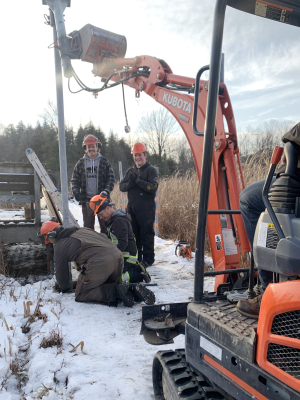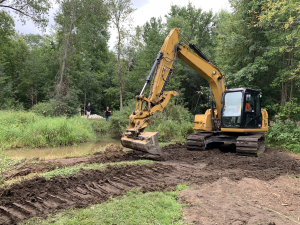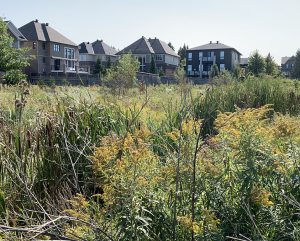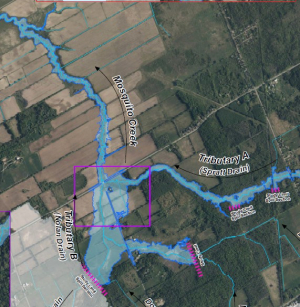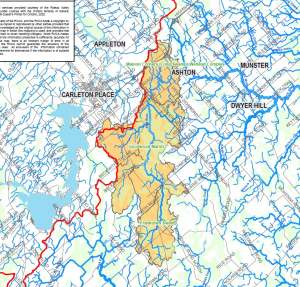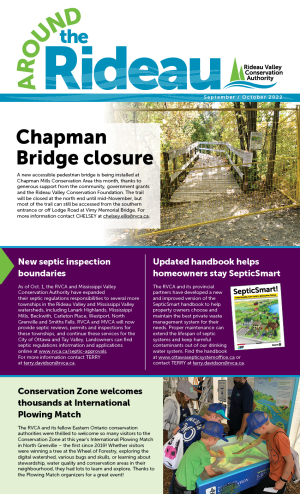Super User
Board of Directors
The RVCA Board of Directors is made up of appointees from the Rideau's 18 member municipalities plus an agricultural member appointed by the Minister. These representatives oversee the work of the conservation authority.
|
Member
|
Representing
|
| Councillor Kristin Strackerjan - Chair | Municipality of North Grenville |
| Anne Robinson - Vice-Chair | City of Ottawa |
|
VACANT
|
|
|
Deputy Mayor Adrian Wynands
|
|
|
Deputy Reeve Brian Dowdall
|
|
| Councillor Susan Irwin | Township of Central Frontenac |
| VACANT | City of Clarence Rockland |
| Reeve Steve Fournier | |
| Deputy Mayor Anne Barr | Village of Merrickville-Wolford |
| Councillor Trevor Johnson | |
|
VACANT
|
|
| Councillor David Brown | City of Ottawa |
| Councillor Sean Devine | City of Ottawa |
| Councillor Theresa Kavanagh | City of Ottawa |
| Councillor Wilson Lo | City of Ottawa |
| Councillor Gary Waterfield | Town of Perth |
| Councillor Jeff Banks | Township of Rideau Lakes |
|
Mayor Shawn Pankow
|
|
| Councillor Adam Turcotte | |
| Councillor Angela Pierman | |
| Councillor Barry Card | |
| Mel Foster | Agricultural Sector |
Nature For All breaks ground on accessible Baxter bridge
KARS-ON-THE-RIDEAU, Nov. 28, 2022 – The dream of turning Baxter Conservation Area into an accessible nature haven for people of all abilities is finally coming true.
After three years of planning and fundraising, work has begun to replace the park’s defunct marshland bridge with a new state-of-the-art span that embraces the gold standards of accessible design. This includes an extra-wide deck, appropriate sight-lines for people in wheelchairs and strollers, and a large education platform to help students of all abilities get up close and personal with the natural world.
“The outdoors should be accessible to anyone who wants to enjoy it: plain and simple,” said Dan Cooper, co-chair of the Nature For All committee and Director of Conservation Lands at the Rideau Valley Conservation Authority (RVCA). “We’ve done the work to ensure this bridge serves visitors of all ages and abilities.”
The bridge construction was made possible thanks to tireless fundraising efforts by RVCA’s charitable partner the Rideau Valley Conservation Foundation, which garnered more than $800,000 in support from individual donors, community organizations, government grants and corporate sponsorships.
“We are thrilled and humbled by the community support for this project,” said Foundation director Diane Downey. “It really shows how much our visitors and partners value inclusivity at our parks.”
Construction will continue throughout the winter and will not result in any new trail closures.
Inclusive Infrastructure
Being in nature is good for body and soul, but people with disabilities are disproportionately excluded from outdoor spaces because they’re inaccessible, unsafe or both.
The people behind Baxter Conservation Area are trying to change this. The conservation area is slowly but surely becoming Eastern Ontario’s most accessible wilderness haven, with gold-standard accessibility features added each year throughout the park.
Baxter has already invested in accessible equipment such as wheelchair-friendly picnic tables, a beach mat down to the water and wheelchair-accessible sleds for the winter months. Outhouses and change huts have been made more accessible, and this winter, new accessible washrooms will be installed at the interpretive centre thanks to a generous federal community improvement grant.
The Nature For All committee also plans to upgrade the park’s five kilometres of trails to include wider, more comfortable boardwalks and more wheelchair-friendly graded stone-dust paths.
These upgrades will allow us to welcome people of all ages and abilities safely and comfortably to our park. These groups include (but are not limited to):
- People with physical or intellectual disabilities
- Seniors with mobility concerns
- Students and special education classes

- Groups from local day programs, assisted living facilities and long-term care homes.
“Nature and wilderness should be for everybody. That’s where you begin to find yourself,” said Mike Nemesvary, founder of Nature For All and long-time accessibility advocate. He has been visiting Baxter in his power wheelchair for 20 years, after a training accident in his 20s left him paralyzed on his path to becoming a world champion freestyle skier.
“Baxter Conservation (will be) a model of accessibility for other conservation areas. People from all across Canada can come here and see how much effort and time was put into the planning, and that the planning has really paid off.”
To learn more or donate to the Nature For All project, visit https://www.rvcf.ca/ways-to-give/nature-for-all-project.
-30-
Bill 23: Less Protection, More Cost, Diminished Local Decision-Making
Taxpayers, municipalities and our natural systems will bear the costs of the Province’s affordable housing legislation released last month.
Email your MPP using our Sample Letter (Word Document)
While the Rideau Valley Conservation Authority strongly supports efforts to address the ongoing housing crisis, many of the proposed changes related to conservation authorities will have significant impacts and costs while doing little to increase housing supply.
Proposed changes and their impacts:

- Weakening the regulatory ability of CAs to protect people and property from natural hazards like flooding, erosion and slope failures - leading to greater risk of property damage and public safety.
- Eliminating the CA’s ability to address water quality issues through planning and permitting, leading to increased nutrients and sediment in lakes and rivers. We know from the 1990s this causes excessive weed growth and algae blooms that have economic impacts on property values, agriculture, tourism, recreation, fisheries and sources of drinking water for many residents.
- Reducing wetland evaluations and protections, leading to increased flooding, erosion and drought, as well as diminished groundwater, which is the source of drinking water in much of rural Ontario. Studies have shown the loss of wetlands in the Rideau watershed would increase flood levels by 10%.
- Downloading more responsibilities to municipalities who have indicated will lead to inefficiencies, delays and increased risk and costs.
- Freezing development fees, which will pass development costs to taxpayers instead of growth paying for growth.
Take Action
To learn more or to provide input on the proposed changes, visit the Environmental Registry of Ontario for these Notices:
- URGENT: Closes Dec. 9, 2022: Legislative and regulatory proposals affecting conservation authorities to support the Housing Supply Action Plan 3.0 (ERO number 019-6141)
- Closes Dec. 30, 2022: Proposed updates to the regulation of development for the protection of people and property from natural hazards in Ontario (ERO number 019-2927)
- Closes Dec. 30, 2022: Proposed changes to natural heritage protections and regulations (ERO number 019-6161)
Or use our sample letter to email your MPP:
More Resources:
Eastern Ontario Mayors Support CA Concerns About Housing Bill 23
RIDEAU VALLEY, Nov. 17, 2022 – More than 30 Eastern Ontario mayors have endorsed a Conservation Authority letter to the province expressing concerns with provincial Bill 23, the More Homes Built Faster Act.
The letter, written by 10 Eastern Ontario CAs, was sent to Premier Doug Ford and relevant cabinet ministers earlier today.
“We are overwhelmed and incredibly grateful for the support we have received from local municipalities,” said Sommer Casgrain-Robertson, General Manager of the Rideau Valley Conservation Authority. “It was disheartening that this bill only had a 30-day consultation period given the magnitude of the proposed changes and that this short consultation period fell during the turnover of municipal councils.”
In their letter, the Eastern Ontario CAs outline six key concerns with the bill and how the changes will negatively impact local development review processes, download new responsibilities to municipalities, increase costs to taxpayers, increase the risk of flooding, erosion and slope failure and damage the local environment.
But the CAs also provide recommendations to the province of how to improve Bill 23 and call for meaningful consultation with CAs, municipalities, and the development and agricultural sectors to identify real solutions that will increase housing without having unintended and irreversible consequences.
It is well understood that water flows across municipal boundaries – and so do the impacts of development. That’s why over the past 70 years, municipalities have formed 36 CAs across Ontario to assess and understand the cumulative impact of development within each watershed. At a time when climate change is causing more frequent and intense storm events, the role of CAs has never been more critical.
Learn more:
- Eastern Ontario Conservation Authority Joint Letter to Premier Ford, Minister Clark, Minister Smith and Minister Piccini (PDF)
- RVCA Responds to Province’s More Homes Built Faster Act
Provide input on the proposed changes through the Environmental Registry of Ontario:
- Proposed updates to the regulation of development for the protection of people and property from natural hazards in Ontario (ERO number 019-2927)
- Legislative and regulatory proposals affecting conservation authorities to support the Housing Supply Action Plan 3.0 (ERO number 019-6141)
Consider sending our sample letter to your local MPP:
-30-
Bill 23: Less Protection, More Cost, Diminished Local Decision-Making
RVCA Responds to Province’s More Homes Built Faster Act
RIDEAU VALLEY, Nov. 10, 2022 – Taxpayers, municipalities and our natural systems will bear the costs of the Province’s affordable housing legislation released last month.
While the Rideau Valley Conservation Authority strongly supports efforts to address the ongoing housing crisis, many of the proposed changes related to conservation authorities will have significant impacts and costs while doing little to increase housing supply.
“Improvements to the system must never be at the expense of protecting people and their properties from flooding, erosion and slope failures, or protecting the very features that reduce these risks such as wetlands,” said Sommer Casgrain-Robertson, General Manager of the Rideau Valley Conservation Authority.
Proposed changes and their impacts:
- Weakening the regulatory ability of CAs to protect people and property from natural hazards like flooding, erosion and slope failures - leading to greater risk of property damage and public safety.
- Eliminating the CA’s ability to address water quality issues through planning and permitting, leading to increased nutrients and sediment in lakes and rivers. We know from the 1990s this causes excessive weed growth and algae blooms that have economic impacts on property values, agriculture, tourism, recreation, fisheries and sources of drinking water for many residents.
- Reducing wetland evaluations and protections, leading to increased flooding, erosion and drought, as well as diminished groundwater, which is the source of drinking water in much of rural Ontario. Studies have shown the loss of wetlands in the Rideau watershed would increase flood levels by 10%.
- Downloading more responsibilities to municipalities who have indicated will lead to inefficiencies, delays and increased risk and costs.
- Freezing development fees, which will pass development costs to taxpayers instead of growth paying for growth.
“We are calling on the Provincial Government to reconvene their multi-stakeholder Conservation Authorities Working Group to consider the impacts of these proposed changes,” said Casgrain-Robertson, who is a sitting member of the working group. “The working group has proven it can provide effective recommendations to government that increase housing supply without jeopardizing public safety, dismissing natural systems or downloading additional responsibilities to municipalities.”
The Ontario Association of Municipalities (AMO) shared similar concerns, stating “many of the proposed amendments to the Conservation Authorities Act and the Planning Act in Bill 23 are concerning, as they signal a move away from environmental protection at a time when climate change impacts are being felt more at the local level. Bill 23 proposes sweeping changes to the regulatory responsibilities of Ontario’s 36 conservation authorities that, if passed, will undermine the collaborative and productive changes put forward by the Ministry led Conservation Authority Working Group over the past two years”.
It is well understood that water flows across municipal boundaries – and so do the impacts of development. That’s why over the past 70 years, municipalities have formed 36 CAs across Ontario to assess and understand the cumulative impact of development within each watershed. At a time when climate change is causing more frequent and intense storm events, the role of CAs has never been more critical.
“CAs have proven they are not a barrier to development, but rather facilitate sound and reasonable growth,” said Pieter Leenhouts, Chair of the Rideau Valley Conservation Authority. “They have been modernizing their policies and procedures, streamlining approvals, reducing timelines, meeting and reporting on service standards and promoting pre-consultation with applicants to provide the best service possible to municipalities, communities, residents and developers.”
Not a barrier:
- The Province’s “Housing Affordability Task Force Report” introduced 55 recommendations to increase the housing supply in Ontario, and CAs were not named within the report.
- CAs save municipalities and developers time and money, as the cost-efficient CA system allows member municipalities to share the expertise of CA hydrogeologists, biologists and engineering staff to review planning applications instead of each hiring their own – a huge savings for taxpayers.
- CAs also save the Province and taxpayers money by reducing the financial impacts of severe flooding like Eastern Ontario experienced in 2017 and 2019. The province’s own Special Advisor on Flooding, Doug McNeil, in his 2019 report found that Ontario’s unique CA system remains the fundamental reason why Ontario has not seen the same catastrophic flooding impacts in the billions of dollars as Alberta and BC, which do not have CAs to direct development away from high-risk areas.
“CAs are recognized as a cost-efficient, collaborative partner,” said Casgrain-Robertson. “We are committed to helping Ontario meet its housing goals by ensuring safe and sustainable development that balances the needs of people and the environment, the economy, and local ecology.”
For more information about the RVCA and CA roles and responsibilities, visit www.rvca.ca.
To learn more, or to provide input on the proposed changes, visit the Environmental Registry of Ontario for these Notices:
- Proposed updates to the regulation of development for the protection of people and property from natural hazards in Ontario (ERO number 019-2927)
- Legislative and regulatory proposals affecting conservation authorities to support the Housing Supply Action Plan 3.0 (ERO number 019-6141)
ERO 019-2927 also includes a Consultation Guide on how to provide your input.
To read Bill 23, visit the Ontario Legislative Assembly at this web page at Bill 23, More Homes Built Faster Act, 2022
-30-
Hearing Procedures
If your application has been refused or approved with conditions, you can appeal through a the RVCA's Hearing Board.
For guidance, downoad the RVCA Hearing Procedures.





